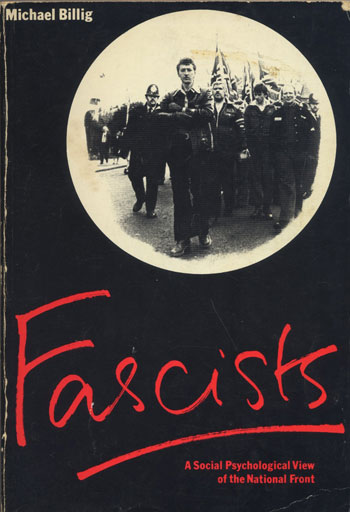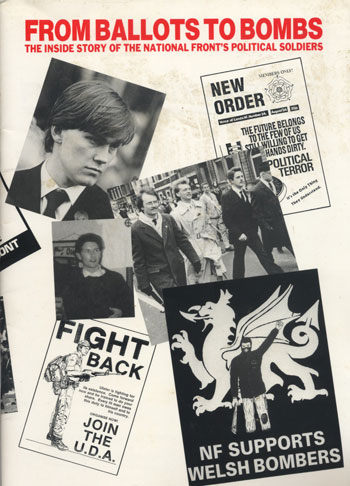Actually, don’t go out of your way to smash them. They are tiny these days and have been completely eclipsed by the more sophisticated British National Party.
In the mid-70s, though, the NF were a force to be reckoned with, both electorally and on the streets. Which naturally put the wind up a lot of people.
For liberals the NF became a sociological problem which needed to be explained and dealt with. For some others the problems created by popular fascism were more immediate. My focus here is mainly on the former.

Martin Walker – The National Front (Fontana, 1977)
Walker was a Guardian journalist who managed to interview a surprisingly large section of the UK far right in the mid 70s. The book is therefore a pretty good resource for insights into the internal politics and mechanisms of the party. It also includes some great bitchiness about different factions which is always great to read, eh?
I found this especially worthwhile for the detailed look a the NF’s formation out of various strands on the far right – former Blackshirts, “empire loyalists”, community groups opposed to immigration, sections of the Tory “Monday Club” and outright neo-nazis.
Whilst the subject matter is obviously quite grim there are some hilarious asides, my favourite being some disgruntled NF members who were kept waiting for two hours during their first visit to Germany while John Tyndall ponced about in a shoe shop trying for find the most nazi-looking jack boots to buy.

Michael Billig – Fascists: A Social Psychological View of The National Front (Harcourt Brace Jovanovich, 1978)
Billig was a lecturer in psychology at Birmingham University when he wrote this interesting book. It is perhaps a little too academic in tone for some, but is actually clearly and insightfully written, especially when compared to some of the convoluted pomo gibberish which passes for academic literature these days.
There are three sections to the book:
The first part looks at various methods which have been used to analyse “the fascist personality”, including Adorno, Reich and especially Fromm’s “F Scale” of authoritarianism/fascism. Whilst there is some merit in this approach, Billig is clear about its limitations. It should be blindly obvious to anyone with a vague interest in extreme politics that people are attracted to ideologies and political organisations for a whole host of reasons including status and the social.
The psychological approach towards analysing poltiical activists can also be used to demonise one’s enemies – it’s a technique used just as much against anarchists and communists by the mainstream media as with the far right. Demonisation may make people feel like they have the moral high ground but that isn’t a useful tool in the fight against fascism. Understanding why people are drawn towards far right groups can be a key factor in preventing this happening or providing an anti-fascist alternative.
The second section examines the ideology of the National Front with particular reference to its publications. I found Billig’s meticulous analysis of John Tyndall’s Spearhead magazine especially useful. He charts the rag’s development from independent pro-Hitlerian organ to an official NF journal which was outwardly racist but not nazi. Billig is adept at uncovering the coding at the heart of the “respectable” facade which allows fascists to retain their virulent anti-semitism by substituting phrases like “rootless cosmopolitan bankers” for “jews”. Of course this is now widely known but I haven’t seen it explained as well anywhere else.
Also included is a cogent overview of the NF’s use of IQ and Race theories to bolster their prejudice. This material also formed the basis for Billig’s Psychology, Racism & Fascism pamphlet which I have previously mentioned here.
The final section of the book concerns interviews with several National Front members, with transcripts.

Searchlight – From Ballots To Bombs: The Inside Story of The National Front’s Political Soldiers (Searchlight, 1989)
Pamphlet covering the weirder ideological developments of the NF in the mid 80s. I.e. toadying up to Gaddaffi, trying to be mates with the Nation of Islam in Hackney, etc. Fascists desperately scurrying around trying to find some new ideas when the electoral route didn’t pan out (their ideas ripped off by the tories, the cultural war lost to the anti-nazi league, and John Tyndall grossly over reaching what the party was capable of in the 1979 elections and nearly bankrupting them in the process). This era saw the front moving increasingly towards elitism and terrorism when it became clear how marginal they were. A salutary lesson in how fascism operates in different ways at different points in history – and that this requires different tactics.
After the introduction, the format used is a bunch of autobiographies of people who became disatisfied with their involvement with far right politics. The “people” are composites though, which opens the door to a whole can of worms about the role of Searchlight’s contacts and infiltrators, the organisation’s pride in its relationship with the police and the secret state, and more basic issues about whether the booklet is propaganda or investigation.
Still worth a read if you’ve been following the furore about Tony Wakeford (and his associates such as Richard Lawson) and their involvement with the NF during this period.
Part Two will follow next week.